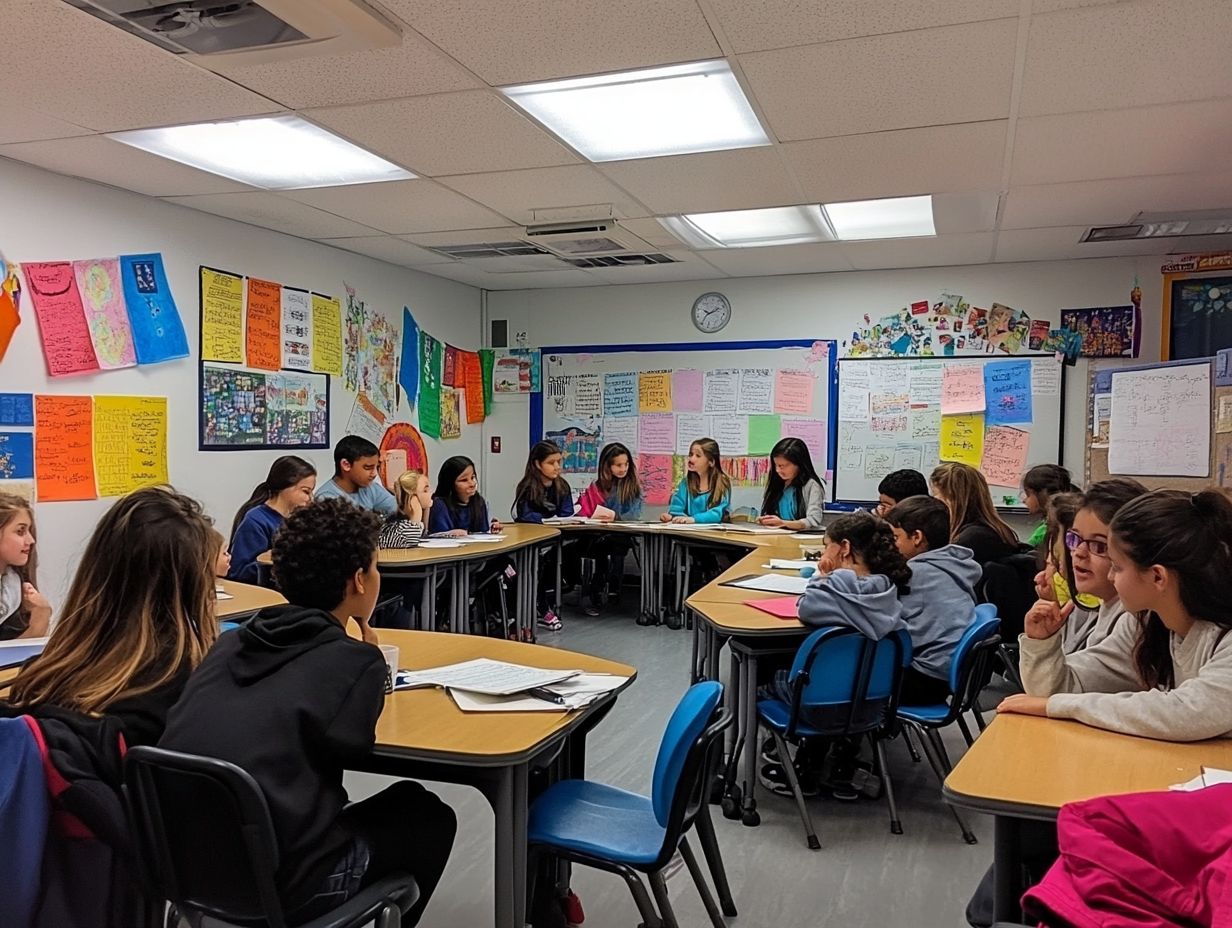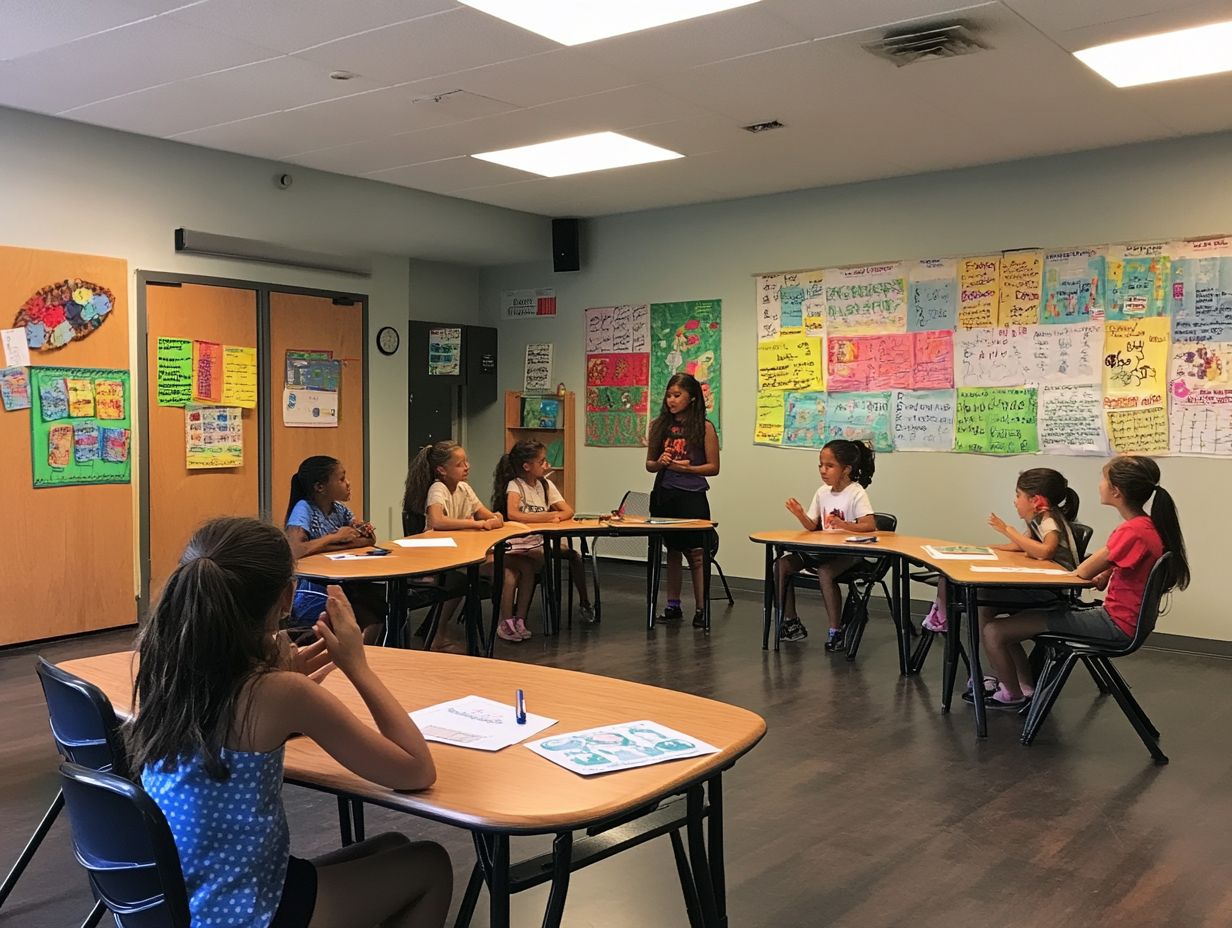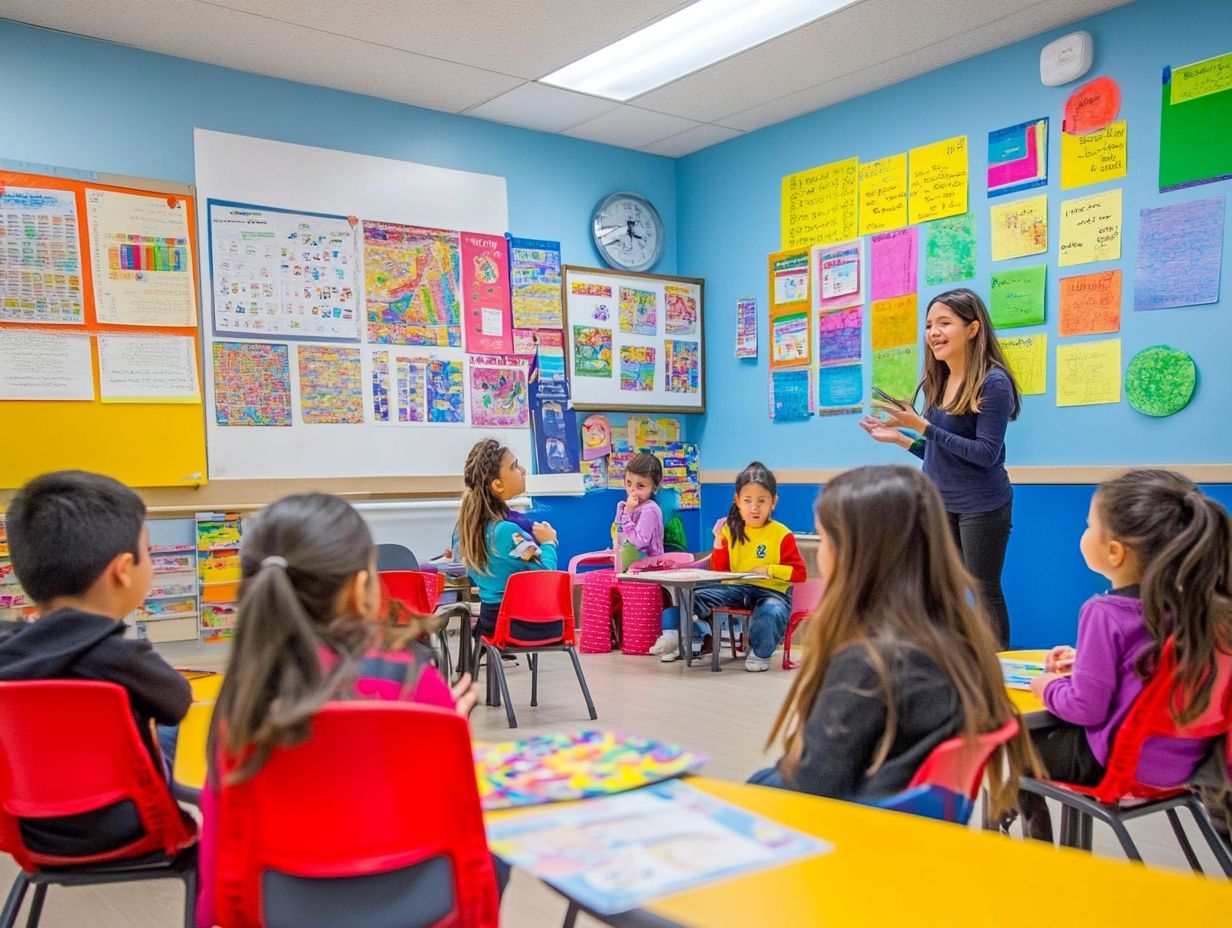the psychology of language immersion
Language immersion transcends mere language learning; it s an enriching journey that captivates your mind and stirs your emotions. It immerses you in culture.
This exploration delves into the multifaceted nature of language immersion, revealing its cognitive and social benefits and its profound impact on brain development. You ll discover effective techniques for mastering a language, confront the typical challenges learners encounter, and appreciate the vital role cultural understanding plays in this process.
Join us on this exciting journey to discover the transformative power of language immersion!
Contents
- Key Takeaways:
- The Concept of Language Immersion
- The Psychological Benefits of Language Immersion
- The Impact of Language Immersion on Brain Development
- Language Immersion Techniques and Strategies
- Overcoming Challenges in Language Immersion
- The Role of Culture in Language Immersion
- Frequently Asked Questions
- What is the psychology of language immersion?
- How does language immersion impact brain development?
- What are the psychological benefits of language immersion?
- Can language immersion have any negative effects?
- How does language immersion affect language learning in children?
- What are some effective strategies for language immersion?
Key Takeaways:

Language immersion is a method of learning a new language where the learner is fully immersed in the target language environment. It can provide cognitive, social, and emotional benefits.
Language immersion has been found to have a positive impact on brain development, leading to neurological changes and increased brain plasticity. It can also improve memory and critical thinking skills.
To make the most out of language immersion, effective techniques and strategies such as immersing oneself in the culture, using multiple modes of learning, and seeking out authentic experiences should be utilized.
The Concept of Language Immersion
Language immersion is an educational approach that envelops children in a second language. It greatly enriches their language acquisition capabilities.
This method not only champions bilingual education but is also widely embraced in preschool settings, especially within French immersion programs. By prioritizing early language learning, it gives children the power to become fluent speakers while simultaneously fostering cognitive skills and deepening cultural understanding.
Defining Language Immersion and its Purpose
Language immersion is a transformative teaching method that immerses you in an environment rich with your target language. It makes natural language acquisition a seamless experience.
Traditional language education often focuses on grammar drills and vocabulary memorization. Immersion, however, invites you to engage with the language in vibrant, real-world contexts.
This experiential approach boosts your fluency and cultivates your understanding of language structure. As you navigate conversations and cultural nuances, you ll enhance your cognitive abilities, honing skills like problem-solving and critical thinking.
This deeper understanding will elevate your language proficiency and equip you with valuable skills that extend beyond language learning, enriching your overall educational journey.
The Psychological Benefits of Language Immersion
The psychological benefits of language immersion go far beyond simply acquiring language skills. Understanding the role of community in language immersion plays a crucial role in fostering cognitive growth and enhancing thinking and planning skills in children.
By participating in immersion programs, students encounter a distinctive array of psychological effects. These nurture critical reasoning and cognitive flexibility, equipping them for success in an increasingly multilingual world.
Cognitive Advantages
One of the most significant cognitive advantages of language immersion is its remarkable ability to enhance bilingualism. This profoundly impacts your critical reasoning and cognitive flexibility.
This immersive experience sharpens your memory skills while fostering improved thinking and planning skills. It enables you to plan, organize, and execute tasks with greater proficiency.
As you navigate multiple languages, you develop a heightened awareness of linguistic nuances. This further enhances your analytical abilities and problem-solving skills.
These cognitive benefits extend well beyond language, influencing broader aspects of your development. In educational settings, such immersion can lead to richer interactions and enhanced learning outcomes.
Ultimately, this guides you toward more strategic educational choices that prioritize cognitive advancement through language proficiency.
Social and Emotional Benefits

Language immersion not only boosts mental skills but also brings significant social and emotional advantages. It nurtures your emotional intelligence and enhances your social skills.
Research shows that these immersive environments encourage you to engage in collaborative activities with peers. This sharpens your ability to communicate effectively and resolve conflicts.
As you navigate different cultural contexts, you not only learn a new language but also cultivate empathy and understanding for diverse perspectives. These interactions foster greater emotional resilience and strengthen your ability to tackle challenges.
Studies have demonstrated that bilingualism positively influences adaptability, allowing you to thrive in various social situations. Ultimately, this not only strengthens your interpersonal relationships but also contributes to a greater sense of overall psychological well-being.
The Impact of Language Immersion on Brain Development
Imagine diving into new cultures and experiences! Language immersion plays a crucial role in shaping brain development, resulting in notable neurological transformations and improved cognitive growth in children.
Research reveals that immersive environments actively stimulate the brain’s ability to change and adapt based on experiences, fostering greater adaptability and enhancing cognitive skills.
Neurological Changes and Plasticity
The neurological changes that occur with language immersion are fundamental to brain plasticity. This enables you to adapt your cognitive skills to meet various learning demands.
When you immerse yourself in environments brimming with diverse languages, your brain undergoes noteworthy structural and functional transformations. These adaptations enhance your language acquisition and elevate executive functions such as attention control, problem-solving, and multitasking abilities.
As you encounter different linguistic structures and vocabulary, your brain develops stronger connections between neurons, creating a more robust cognitive framework.
These improvements carry significant implications in educational settings. They allow for the creation of customized learning experiences tailored to individual needs, promoting inclusivity and boosting overall academic performance.
Ultimately, these neurological advancements set the stage for a more dynamic and effective approach to education.
Language Immersion Techniques and Strategies
Language immersion techniques and strategies are crucial for developing effective methods that address diverse learning needs. By focusing on individualized instruction and tailored curriculum choices, you can create a rich and engaging environment that fosters growth and understanding.
Effective Methods for Learning a Language
Effective methods for learning a language in immersion settings involve interactive teaching strategies that captivate young learners and encourage active participation.
These strategies often incorporate games, songs, and storytelling, allowing children to effortlessly absorb new vocabulary and sentence structures in a way that feels natural and enjoyable.
By transforming the learning environment into a vibrant space where kids can freely express themselves and engage with their peers, the immersion approach cultivates a strong sense of community while simultaneously enhancing language acquisition.
This dynamic atmosphere is essential in preschool education, as it not only builds language skills but also nurtures social-emotional development, equipping young minds for future academic success and effective communication.
Overcoming Challenges in Language Immersion

While language immersion offers a wealth of benefits, it also introduces a variety of challenges. You may encounter common obstacles that can impede your language acquisition and learning process, requiring careful navigation to truly maximize the experience.
Common Obstacles and How to Overcome Them
Common obstacles in language immersion include learner disengagement, cultural barriers, and a lack of resources. These challenges can make it harder to engage fully in immersion programs. You might feel lost or alienated, which can diminish your enthusiasm and motivation.
Cultural barriers may lead to misunderstandings and hinder effective communication. Furthermore, insufficient materials can restrict your exposure to authentic language use.
To tackle these issues, educators can use interactive activities that promote collaboration among learners. They can also incorporate technology to enhance resource availability and create cultural exchange programs that immerse you in the target language environment.
These strategies not only encourage you to participate more actively but also create a supportive atmosphere that enriches your overall learning experience.
The Role of Culture in Language Immersion
The role of culture in language immersion is essential. It provides a rich backdrop that elevates language learning and fosters cultural sensitivity. This cultural dimension deepens your understanding and enriches the learning experience.
By embracing culture, you can connect more meaningfully with the language and its speakers.
Understanding Cultural Context and Sensitivity
Understanding cultural context and sensitivity is crucial in language immersion. It shapes your educational choices and influences how you learn different languages.
Cultural nuances are vital for grasping the complexities of any language. Immersion programs that weave in local traditions, customs, and historical narratives can greatly strengthen your connection to the material.
Imagine participating in local festivals or cooking classes. You ll immerse yourself in the language within a context filled with cultural significance. Engaging with community members allows you to use the language in real-life situations, boosting both your confidence and skills.
These immersive experiences help you build real connections with the language, leading to a deeper understanding and better retention.
Frequently Asked Questions
What is the psychology of language immersion?
The psychology of language immersion studies how being immersed in a new language affects your brain and behavior. It looks at the science behind language immersion effectiveness, including the effects on thinking, emotions, and social interactions in an immersive environment.
How does language immersion impact brain development?
Research shows that language immersion can positively impact brain development, especially in memory, attention, and problem-solving. Learning a new language helps your brain create new connections and strengthens existing ones.
What are the psychological benefits of language immersion?
Language immersion offers many psychological benefits. It improves critical thinking skills, increases empathy and cultural sensitivity, and boosts self-confidence. You ll also gain a sense of accomplishment as you become more proficient in the new language.
Can language immersion have any negative effects?
While language immersion is generally beneficial, it can also come with some challenges. Initially, you may feel frustration and anxiety, along with a sense of cultural disorientation. However, these feelings are usually temporary and can lead to personal growth in the long run.
How does language immersion affect language learning in children?
Language immersion is highly effective for children because their brains are more adaptable to new languages. It can greatly enhance their language skills, cognitive abilities, and cultural awareness.
What are some effective strategies for language immersion?
Some effective strategies for language immersion include programs where you only speak the target language. Daily practice and exposure to the language are also crucial.
Using various learning techniques such as games, songs, and cultural activities can enhance your experience. A positive mindset is important, so be open to making mistakes; they are part of the learning process. Start immersing yourself today and see how quickly your language skills can improve!







